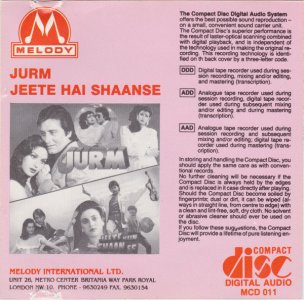D
Deleted member 15865
Guest
Yesterday an old CD reseller pointed out to me that CDs marked DDD are the best. I researched today and found out that it is the SPARS code.
The three letters denote in which form the CD was recorded, mixed and mastered respectively - analog (A) or digital (D). Of course DDD means all three stages were done digitally and would sound the best when player back on a CD player. The next best would be DAD. Today I was listening to a DDD CD of Devaki Pandit and noticed how smooth and clear the sound is. In short, DDD>DAD/ADD>AAD. Any conjectures in which out of DAD/ADD would be better? I’d imagine DAD as the recoding is digital. But then digital mixing was costlier (hence prohibitive for the labels back then) than digital recording, so perhaps ADD better than DAD.
Remember, Brothers in Arms by Dire Straits was one of the first CDs (first was one by Ry Cooder, another favourite of mine) in a DDD format. So, you could now look for this small code on the case as well as the CD itself. I guess today most new recordings would be DDD. But this will help when you buy anything that was made from the 70s to the 00s.
Any further dope or experience on this?
The three letters denote in which form the CD was recorded, mixed and mastered respectively - analog (A) or digital (D). Of course DDD means all three stages were done digitally and would sound the best when player back on a CD player. The next best would be DAD. Today I was listening to a DDD CD of Devaki Pandit and noticed how smooth and clear the sound is. In short, DDD>DAD/ADD>AAD. Any conjectures in which out of DAD/ADD would be better? I’d imagine DAD as the recoding is digital. But then digital mixing was costlier (hence prohibitive for the labels back then) than digital recording, so perhaps ADD better than DAD.
Remember, Brothers in Arms by Dire Straits was one of the first CDs (first was one by Ry Cooder, another favourite of mine) in a DDD format. So, you could now look for this small code on the case as well as the CD itself. I guess today most new recordings would be DDD. But this will help when you buy anything that was made from the 70s to the 00s.
Any further dope or experience on this?
Last edited by a moderator:


